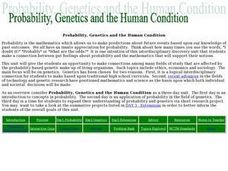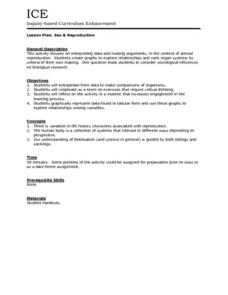Curated OER
Human Ecology: How it Relates to Population
Ninth graders are introduced to the concept of population. In groups, they research the problems associated with overpopulation and underpopulation. They practice calculating birth and death rates and discus how they can be used to...
Curated OER
Solid Waste and Recycling
Students demonstrate effects of waste on environment and ways of reducing it, observe how much packaging goes into bag lunches each day, and survey their families to assess awareness levels and household recycling practices. Lessons all...
Curated OER
Stopping Deforestation in the Amazon: A Publicity Campaign
Young scholars investigate the environment by designing a group project. In this ecology lesson, students identify the man made threats to the Amazon while reading environmentally conscience vocabulary terms. Young scholars...
Curated OER
UV Beads
Young scholars recognize preventitive measures that can be taken to reduce the risks associated with exposure to solar radiation. They explain why solar radiation can be harmful. They utilize beads that turn color when exposed to UV...
Curated OER
Probability, Genetics and the Human Condition
Students explore the concept of probability as it relates us to be able to make predictions about future events based upon our knowledge of past outcomes. They have an innate appreciation for probability. Students make a connection...
Curated OER
Sex & Reproduction
Students examine animal reproduction by interpreting data and making arguments and then create their own graphs to explore relationships of organ systems. This lesson includes an individual worksheet and a reflective review question for...
Curated OER
Whose Rock Is This Anyway?
Students will seek to understand the events at Pipestone Quarry and what may have caused them. Pipestone Quarry in Pipestone, Minnesota, bears the mythic red Sioux quartzite called Pipestone or Catlinite.
Curated OER
Consider the Issues
Students develop and express opinions on personal and societal issues in biology through journal entries (written and other forms), oral position statements and group discussions.







